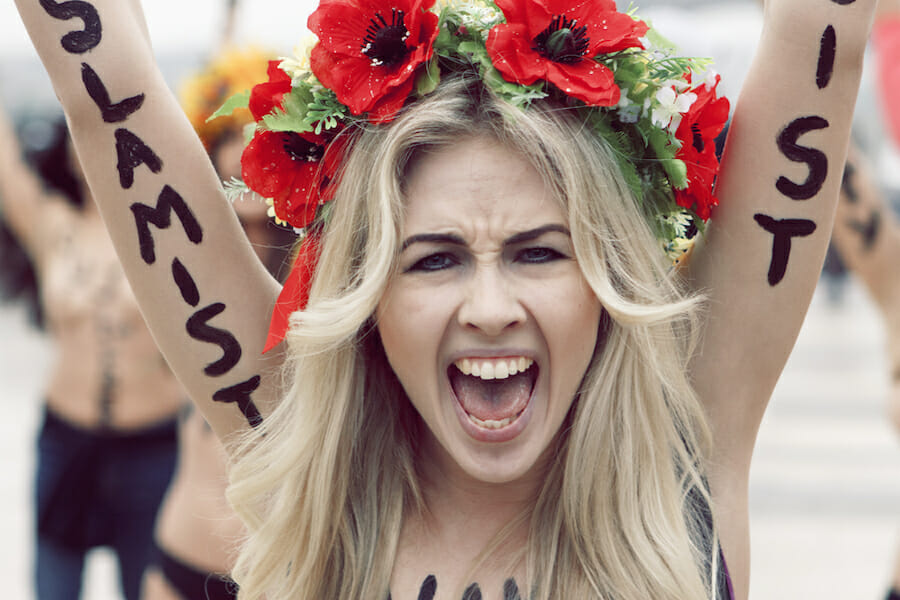
‘Muslim Women Let’s Get Topless’: Off the Mark with FEMEN
“If you are interested [in registering], it’s not complicated. You just have to take off your t-shirt.” – Eloise, Femen co-ordinator, Sep 19, 2012
The founding of the anti-prostitution outfit, Femen, had and still does have, a genuine basis of protest. Exploitative sex-tourism in Ukraine is something women and men would understandably take a strong stand against, and local resistance has been scanty (no pun intended). Ditto numerous countries where sexual slavery has found itself growing on the coattails of globalisation and corrupt governments. But as has been noted by commentators in, for want of a better term “industrialised” countries, rarely does the conversation move beyond the shock photo stunts the group wishes to disseminate. In other words, the conversation becomes less a matter of revolution than a sense of whether one’s sets of breasts are better than another’s. When the message of protest gets mired in tactics rather than aims, it’s bound to get lost in the hubbub.
The attempt by Femen to project a more European-broad protest – bare-breasted, of course – has been announced, with the ladies of the group taking their tops off in various European capitals. So far the group has lacked a “base” to launch their indignation.
Paris has been greeted with the Femen flavour, and the website of Femen France features “Nudité, Lutte and Liberté” in the tricolour scheme, all against a backdrop of taut, curvy flesh. Products can be purchased as well – the Femen Handbag, the Femen Hoody, and an assortment of shirts such as “F’Kamikaze.”
The latter is surely ironic – a topless women’s outfit that makes money selling tops. Themes of protest do move in mysterious ways.
Paris is now the base for the first ‘training centre’ which will school feminist recruits on the art of dodging security forces. In the words of one of the outfit’s more notorious figures, Inna Shevchenko, “We’re opening the first international training centre for feminists…who want to transform themselves into soldiers.” To celebrate the occasion, the protestors marched through a largely Muslim neighbourhood in the 18th arrondissement. “Muslim women, let’s get naked.”
Mindful of her audience, Shevchenko makes sure that the press knows her intellectual interests. She is re-reading August Bebel’s Women Under Socialism (1883). “Women, in the new society will enjoy total independence; […] she will be placed, in relation to man, in a position of total freedom and equality.” She has no desire to return to unequal Kiev yet, not after she was filmed chainsawing an Orthodox Cross in the city in support of her sisters in Pussy Riot.
London has been witness to the topless protests taking a stance against Sharia law and the participation of various “bloody” Islamic states in the Olympics. A hotchpotch medley of rationales were thrown in by Reza Moradi, who did not name any of those offending states in a protest in August. “The Olympic Committee must not have allowed those governments to be represented in the Olympics. They are fascists of our time, they treat women like third-class citizens.” While much of what Moradi is lamenting is relevant, the institutional framework of the Olympics has been historically favourable to “bloody” states, not all of them necessarily Islamic. Oppression, not just of gender, is a spreadable commodity, and there is much of it about.
Femen also made a splash of sorts at the Euro 2012 tournament in Poland and the Ukraine, where they targeted prostitution in host cities. A notable effort was made by Yana Zhdanova in Lviv to snatch the Euro 2012 championship cup, left tantalizingly on display. Femen activist Oleksandra Shevchenko offered an explanation for the foiled action. “We needed to tear down this trophy to show that this phallic symbol does not need to stand on a pedestal, when our country is being turned into a brothel. UEFA have arranged this with our politicians in order to win back the money that has been put into Euro 2012.”
Parisian booby marches certainly garner attention, but of a different sort. It doesn’t necessarily consider issues specific to various groups of women in different countries. Femen risks looking like a noisy university protest group, a tried and tired form of student radicalism that does, at some point, have to find a political agenda. As Joseph Bamat notes, writing for France 24, “Most feminists in France do not feel politically persecuted or oppressed, and tend to focus on more specific problems, such as domestic abuse and equal pay for equal work.” Bamat further speculates that French feminists will retort that “we didn’t have to show our bums to win the right to vote or to abort.”
Sex is a tricky and volatile business, and Femen has taken the slippery line. The coin of oppression and liberation is often one and the same thing. Femen might see their Islamic sisters as enslaved, while many of them most certainly will not. The view is bound to not only be contrary in some circles but dismissed as smutty claptrap, the fantastic yearnings of a pop feminism.
Then, there will be opposition of a different sort. The counter to the bare breast heroines of Femen come from the French prostitutes’ union STRASS, who have been demanding a legalisation of prostitution for some time. When a law was being considered in April 2011 to fine and jail sex clients, members of the organisation went apoplectic. The order of battle has been made, and its bound to be vicious.

